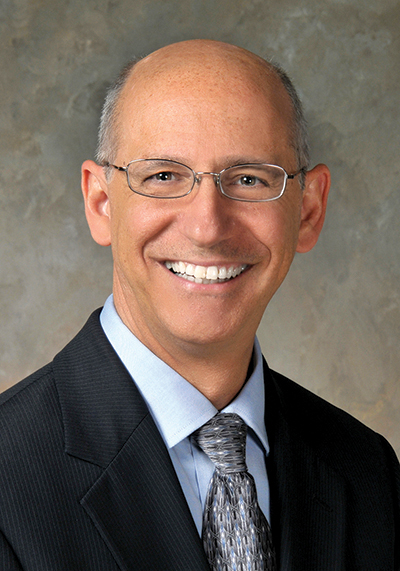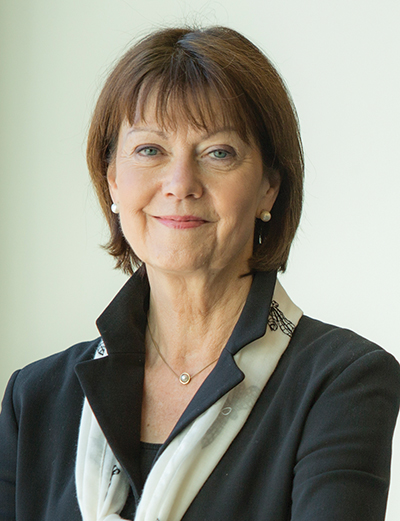

From left: Dr. Joseph Pepe, president and CEO of Catholic Medical Center, and CEO of GraniteOne Health; and Dr. Joanne M. Conroy, CEO and president of Dartmouth-Hitchcock Health. Courtesy photos.
As a proposal to combine Dartmouth-Hitchcock Health (D-HH) and GraniteOne Health moves forward, the concerns expressed at four community listening sessions centered on access to services and mission, particularly the preservation of the Catholic mission at Catholic Medical Center (CMC) in Manchester, the largest hospital member of GraniteOne.
A definitive agreement was readied in September, followed by specific, regulated community sessions. The proposal also must undergo examination by the state’s Charitable Trusts Unit, which reviews acquisition transactions involving health care organizations. The combined organizations would form the state’s largest health system.
The informal sessions were held in May and June in Manchester, Lebanon, Peterborough and Wolfeboro—the sites of the largest member hospitals—to provide information to employees and community members and to gather feedback. The sessions were led by Dartmouth-Hitchcock Health CEO and President Dr. Joanne M. Conroy and Dr. Joseph Pepe, CMC’s president and CEO, and CEO of GraniteOne Health.
“We were pleased by community support for the local hospitals, the level of interest in what the combination will mean,” Conroy says. “There was more excitement than negative energy and people asked really excellent questions, especially about the Catholic mission of CMC.”
Pepe says it was not surprising to hear from the Catholic community. In 1994, a merger between CMC and Elliot Hospital in Manchester dissolved after issues arose, such as concerns about blending the Catholic mission with secular medicine. He says this time CMC brought in the National Catholic Bioethics Center to preserve the right to maintain a Catholic mission. In a 2009 proposal to join CMC an D-HH, Pepe says there were missteps, including diluting the bishop’s reserved powers.
“We’ve been very deliberate to make sure the current structure reflected what needed to be done,” he says.
Pepe says CMC has learned from “the successes” of GraniteOne when it comes to working with secular hospitals as that system also includes Huggins Hospital in Wolfeboro and Monadnock Community Hospital in Peterborough. He says there will be a high degree of autonomy in day-to-day operations, and member hospitals will keep their names, branding and local leadership.
The D-HH system members include Dartmouth-Hitchcock Medical Center in Lebanon, New London Hospital, Cheshire Medical Center in Keene, Alice Peck Day Memorial Hospital in Lebanon, Visiting Nurse and Hospice for VT & NH, and Mt. Ascutney Hospital and Health Center in Windsor, Vt.
While there are likely to be some economies of scale, both Pepe and Conroy say the agreement is driven by the need to increase access to health care and offer new services at a lower cost. Conroy says D-HH is one of the few systems to invest in rural health care, “There are so many advantages to bringing a much deeper bench,” she says. “We know that rural hospitals [that are] not in a group don’t do as well.”
Earlier this year, Littleton Regional Healthcare withdrew from its 2015 affiliation with North Country Healthcare. Conroy says D-HH will continue to support those rural hospitals. “North Country [Health Care] has been trying to work out internally how they dissolve [the partnership] now that Littleton has withdrawn,” she says. “We are not getting involved but hope to support them. Many already use our telehealth services and are in the [New England Alliance for Health] network, which offers buying and pharmacy groups to decrease costs.”
D-HH has primary care practices around the state, but no acute care hospital in Southern NH. “We will be able to do that with CMC. We are expanding the physical plant in Manchester. Where you can get alignment at lower cost you get better care,” Conroy says.
Amid the ever-changing health insurance landscape, Conroy adds all they can do is stay on top of the changes. “The tumultuous health-care changes taking place have brought us to this position,” says Pepe. “Where hospital and hospital systems are consolidated. What republicans and democrats agree on is that we need to move from a fee-for-service to a fee-for-value. To do that, we must invest in infrastructure and be prepared.”
He adds that the state’s health-care landscape has changed and there are many more competitors, “Ten years ago, [almost] every hospital was independent; now, Mass. General has acquired Wentworth-Douglass, HCA is about to acquire Frisbee. The competition in the state is much greater than it was in the past.”
D-HH and CMC have a 15-year history of collaboration on which to build, including: obstetrics, prenatal care, an OB/GYN residency program at CMC’s The Mom’s Place and Special Care Nursery; oncology and cancer treatment at the D-HH Norris Cotton Cancer Center, which provides cancer care on CMC’s campus in Manchester; as well as pulmonology, rheumatology, critical care, endocrinology, and gastroenterology. For more information, visit dartmouth.hitchcock.org or catholicmedicalcenter.org.

 Current Issue - April 2024
Current Issue - April 2024